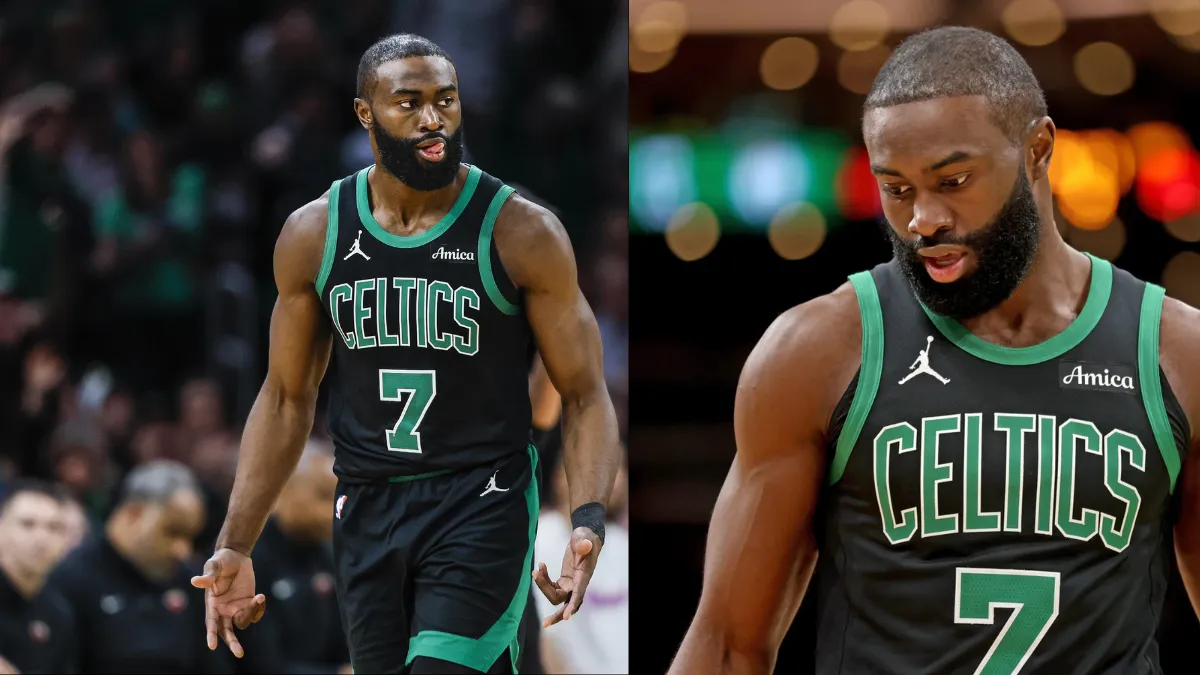When Referees Miss the Mark: Jaylen Brown’s Furious No-Call and What It Means for NBA’s Integrity
In the high-octane world of the NBA, every possession counts—especially in crunch time. Yet, in a recent nail-biter between the Boston Celtics and Utah Jazz, a controversial no-call on a critical moment left Celtics star Jaylen Brown visibly irate and fans pondering the fairness of officiating. This incident is just a microcosm of ongoing debates about NBA refereeing standards, replay technology, and the ripple effects on team morale and league credibility.
The Incident — What Really Happened in the Celtics vs. Jazz Clash?
Late in a tightly contested game decided by two points, the Celtics held a one-point lead as Jaylen Brown managed the ball near the top of the key. Utah’s rookie guard Keyonte George, while defending, noticeably slipped and fell. Brown subsequently tripped over the fallen George and lost possession. Without a whistle or a foul call from the referees, the Jazz recovered, setting up a fast-break alley-oop that swung the lead in their favor with less than a minute remaining.
Brown’s response was sharp and urgent, calling the missed call “unacceptable,” highlighting the intensity and frustration players feel when pivotal moments are overlooked by referees. The Celtics subsequently lost 105-103, dragging their season record to 3-5.
The refereeing crew chief later defended the no-call, explaining the officials observed George slipping first, making Brown’s fall incidental without contact prior to the ball’s release. However, this technical justification didn’t quell frustrations on the Celtics’ side, setting the stage for deeper conversations about officiating consistency and clarity.
Beyond the Highlight Reel: Fresh Insights on NBA Referee Decisions
1. The Psychological Toll of No-Calls on Players and Teams
While fans often fixate on the tactical implications of refereeing errors, the emotional weight on players is substantial but less discussed. A no-call like the one affecting Brown can shake a player’s confidence and cause ripple effects in team chemistry, especially when the team feels robbed in a crucial situation. These mental setbacks have measurable impacts on subsequent performance and cohesion in close games.
2. Replay Technology’s Limits and the Human Element
The NBA has invested heavily in replay review systems, but this incident reveals inherent limitations. Real-time referee decisions still rely on human judgment, where split-second interpretations can dominate. Unlike other sports with automated foul or contact detection sensors, the NBA balances instant replays with live calls, often leading to subjective interpretations. This ongoing tension between tech and tradition fuels debate on how far the league should go to support officials without disrupting game flow.
3. The Game Integrity Quandary: Fans, Officials, and Trust
Missed calls extend beyond moments—they chip away at fan trust in league fairness. Studies show that persistent officiating errors lead to long-term erosion of audience engagement and skepticism about competitive legitimacy. NBA stakeholders face a challenging dilemma: enhancing officiating standards while preserving the unpredictable, human drama that keeps fans hooked.
Celtics-Jazz Incident in the NBA’s Refereeing Landscape
When examined against recent history, the Brown no-call is illustrative rather than exceptional. Injuries, fouls, and boundary violations have frequently been hotspots of controversy. The league has enforced rule tweaks aimed at consistency, yet the subjective nature of basketball officiating means controversy is ingrained.
The incident also reflects a broader trend—rookie players on the opposing team, such as Keyonte George here, can inadvertently influence outcomes, spotlighting how rookie nerves and slips add unpredictable variables that officials must parse instantly.
On a strategic level, coaches now include referee tendencies and past calls in their game planning, showing how the officiating narrative shapes team tactics beyond obvious plays.
FAQ — Your Burning Questions on NBA Officiating Controversies Answered
Q1: Why didn’t the referees call a foul when Jaylen Brown tripped?
Officials noted that George slipped first without making contact. As Brown fell subsequently on the same spot, they judged no foul occurred before possession loss. The refereeing crew chief confirmed this assessment in a post-game report.
Q2: Can the NBA overturn such no-calls after games?
No. NBA doesn’t reverse game outcomes based on officiating errors. But referees and supervisors review contested plays to improve future calls and referee training.
Q3: How often do such no-calls happen and affect games?
Controversial no-calls are a recurring issue. While exact stats vary, several games each season feature debated calls that sway outcomes, making refereeing consistency a perennial league focus.
Q4: What improvements are being explored to reduce officiating errors?
The NBA is researching enhanced replay tech, potential AI-assisted call reviews, and referee training programs emphasizing real-time decision-making under pressure.
Q5: How do players and teams cope with perceived unfair calls?
Mental resilience, strong coaching, and focus on controllable factors help teams rebound from perceived injustices. But repeated no-calls can challenge team morale.

Sam, a dedicated blogger, has immersed himself in the world of content creation for the past five years. His journey reflects a profound passion for storytelling and insightful commentary. Beyond the digital realm, Sam is a devoted NBA enthusiast, seamlessly blending his love for sports with his writing pursuits.

